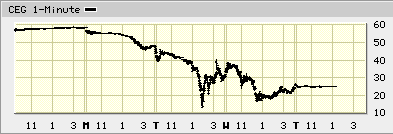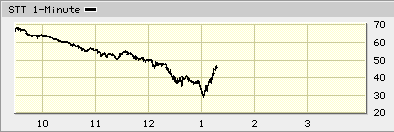If one of your first reactions upon hearing of Warren Buffett's $5 billion investment in Goldman Sachs (GS) was, "Wow, I didn't think Goldman was a Buffett-type company," you are probably not alone. Warren has typically preferred consumer-related businesses with wide moats (high competitive advantage and barriers to entry). He often tells people that he would feel perfectly fine owning Coca Cola (KO) or Wrigley (WWY) if the stock market closed down for five or ten years. It would be hard to have the same level of confidence with Goldman Sachs.
So before you go out and load up on GS common stock on this news, let's review exactly what Buffett is getting, and more importantly, the price he is paying. The $5 billion deal involves two parts:
1) $5 billion in preferred stock
These preferred shares are senior to common stock and pay a 10% annual dividend. Think of them as unsecured bonds paying 10% interest. He is not buying common shares with the initial $5 billion. In addition, if Goldman ever wants to retire these preferred shares (companies typically "call" preferred shares when they have excess cash), they have to pay Buffett a 10% premium to their face value. The vast majority of normal preferreds are callable at par, not at a premium.
2) Warrants to buy $5 billion of common stock at $115 per share
Buffett has the option to buy $5 billion of common stock at $115 per share at any time over the next five years. Keep in mind that while this part is common stock, there is absolutely no risk for Buffett on these warrants. Five years from now, Buffett earns a profit of $43 million for every dollar GS stock trades above $115 per share. If the stock is below $115, he does not lose a dime, as there is no risk on his part. These warrants are essentially call options he is getting free of charge.
From the terms of this investment, we can see why Buffett has decided to invest in an investment bank even though he typically goes for much safer and predictable operating businesses. Goldman does have a superior management team and great talent, but investment banking is not a business I would expect Berkshire to expand into anytime soon.
While he is taking a bit more risk by banking on Goldman's survival, consider how the landscape has changed for Goldman in recent days. Not only has the government indicated they are willing to take dramatic action to help these firms survive, but it also has allowed Goldman to become a bank holding company. Goldman may very well use this new capital to build out their commercial banking operation.
With this deal, Buffett is banking on government intervention succeeding in greatly lowering the risk that Goldman Sachs gets into deep trouble. For such a bet, I'd say Buffett got a great deal by waiting things out and not investing until he figured the odds were stacked strongly in his favor.
Full Disclosure: No positions in the companies mentioned at the time of writing



